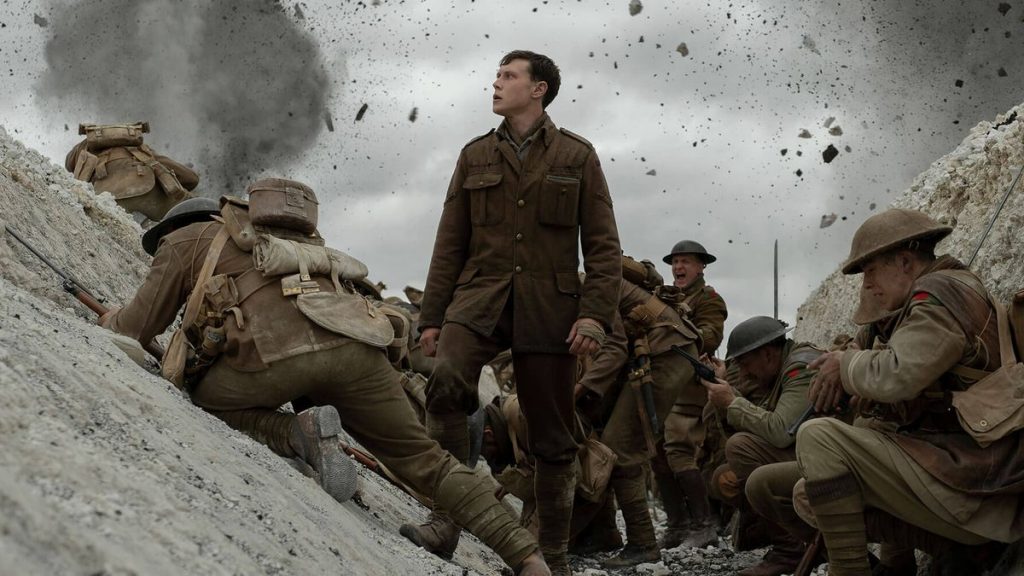It is the First World War.
The unnerving silence of a quaint French town – now occupied by German military forces – is interrupted by the sound of invading soldiers making howling commands. The fall of the night sky cannot help but amplify the echo.
An imposing fire looms in the background; burning with a wild intensity that threatens to engulf the town.
Unbeknownst to the gun-toting German soldiers is the presence of British soldiers hiding amongst the shadows and sneaking through the city. Any movement could risk these lurking soldiers exposure and jeopardise their time-sensitive mission of sharing intel that could prevent the deaths of 1,600 British soldiers.
Yet never too far from the warzone can soldiers find moments of tranquillity; some brief peace from the horrors of battle. The cries of war are replaced with the calming sound of the wind brushing against lush fields of grass that spread as far as the eye can see.
This short-lived grace being a fleeting reminder of what is at risk during war: humanity, innocence, diplomacy. The destructiveness of which is captured with gasp-worthy trepidation in Sam Mendes’ war-epic 1917.
News of an ambush springs into motion the movements of British soldiers Lance Corporal William Schofield (George MacKay) and Lance Corporal Blake (Dean-Charles Chapman). Their mission, requiring them to venture into the heartland of war to disclose enemy intel, is paved with unknown horrors – both physical and psychological – that will have audiences watching 1917 between the gaps of their fingers.
Presented as a non-stop series of horrifying obstacles endured by the two vigilant soldiers, Mendes is hesitant to offer a moment of relief in 1917. Mendes confronting depiction of war demonstrates a technical prowess equal to Coppola, Spielberg and Nolan. He is as observant as he is meticulous. The use of long takes, requiring actors to perform for extended periods without any edits, succeeds in drawing out tension throughout the films two-hour duration. The effect adding credence to the soldier’s journey while highlighting the haunting realisation that one misplaced step could compromise their position.
The Skyfall director maintains this lingering sense of dread when working across open and enclosed spaces. The most effective application of this being seen in Schofield and Blake’s anxiety-inducing crossing of a mud-ridden battlefield; the navigation of which riddled with traps and a graveyard of human and animal corpses.
Leave it to the director of Jarhead to evoke the lion-hearted spirits of soldiers, with MacKay and Chapman solemn in their depictions of young-men pushed into the crossfire of war. The sincerity brought out in their performances convincing the viewer to believe the two lads would be chugging down pints in a British pub – laughing away at life – had there been no conflict. Their impressive efforts standing out amongst a supporting cast of Britain’s finest actors: Colin Firth, Benedict Cumberbatch, Richard Madden, Mark Strong and Andrew Scott.
Only when Mendes attempts to convey the emotional stakes of tragedy, the likes of which involve embers moving through the wind like fiery snow, can the direction feel heavy-handed. Relationships with characters seen off-screen feel underscored by Mendes’ need to point out without any nuance – an effort that comes across as deliberate and detracts from the emotional performances carried on the faces of MacKay and Chapman.
1917 flourishes in the face of tonal inconsistency, the shoehorning of character-centric storytelling slowing a film that functions on haste, thanks to Mendes’ ability to craft awe-inspiring spectacle. This is accomplished both audibly and visually. Thomas Newman remarkably evokes sensations of pain, loss and bravery with his sweeping score. The mood created is emphatic and hopeful, with Newman succeeding to sync sound with performance.
Lifting his game in equal measure to Newman’s sublime score is Roger Deakins grandiose cinematography. What Deakins achieves in 1917 with his stunning exhibition of lighting, sure to follow a similar awards trajectory as his work had on Blade Runner 2049, cannot help but captivate with its majestic artistry.
Despite a lack of dramatic heft, Universal Pictures launches into 2020 with a commanding war-epic that stands a testament to the technical bravado of Mendes, Newman and Deakins.
Director: Sam Mendes
Cast: George MacKay, Colin Firth, Dean-Charles Chapman
Writers: Sam Mendes, Krysty Wilson-Cairns



